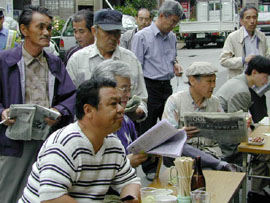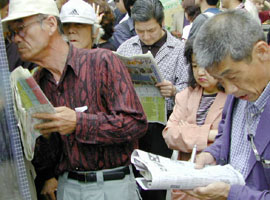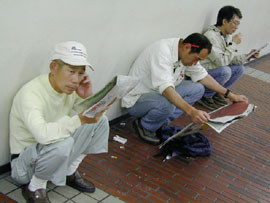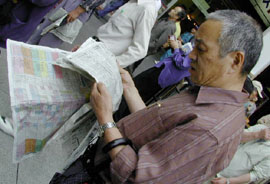Japan's Horse Racing: Changing with the Times
Part One of a Two-Part Series Focusing on Gambling
The taxi poured me out of the back seat and onto the sidewalk near JR Ichigaya Station. It was a little after first light, yet just before the time folks start crowding the public space on the morning crawl to work.
 Propped up by my elbows, I blinked my eyes once, twice, and then three times before peering back through the open door. As he sat hunched over and staring at the nicely inflated meter, the driver repeatedly ran his thumb and forefinger over his lower lip in anticipation.
Propped up by my elbows, I blinked my eyes once, twice, and then three times before peering back through the open door. As he sat hunched over and staring at the nicely inflated meter, the driver repeatedly ran his thumb and forefinger over his lower lip in anticipation.
I rubbed my left hand over both stubbled cheeks, sighed, tossed a few bills into the backseat, waved off the receipt, and watched him speed off. Life in the big city.
While reaching across my body for my bag, a waft of familiar perfume blew in with the breeze from the nearby canal. "You know," she started, "if you wouldn't always drink so much and pass out in the back of the cab, those drivers wouldn't necessarily take advantage of you."
"Morning, my dear," I said, gathering to my feet. "Glad to see you are ready to take the bull by the horns so early." Many of my worries would just flutter away with breeze if junior reporter Junko would show up on time rather than early for work.
"Speaking of beasts of burden," she said, "the Japan Derby finished over one month ago. The Boss asked you for a report on the latest on gambling in Japan and you haven't even lifted a finger." We started walking in the direction of the newsroom.
 "Still doing the necessary background research," I assured. Her nose crinkled and her lips pursed on the word "research." I paused and then continued, "I've got a draft of the first part right here." I reached into my inner coat pocket, dusted off the plastic cover, and handed it to her.
"Still doing the necessary background research," I assured. Her nose crinkled and her lips pursed on the word "research." I paused and then continued, "I've got a draft of the first part right here." I reached into my inner coat pocket, dusted off the plastic cover, and handed it to her.
While she perused the first few pages, I reached for the morning's first cigarette in hopes of relieving the morning's first headache.
When Jungle Pocket dashed across the finish line last month to claim the 68th Japan Derby from Dantsu Flame by a length and a half, fans clutching winning betting tickets at the Tokyo Racecourse roared their approval from the packed grandstands surrounding the oval track.
While their screams may have been deafening, their wagers only amounted to the equivalent of but a few oats on the paddock floor compared to all the feed being thrown about elsewhere. At the 27 government-sanctioned off-track betting shops scattered across Japan, many times more money changed hands than at the Tokyo track. While not new, off-track wagering, in its ever-increasing varieties, has grown in recent years to account for over 90% of all horse wagering in Japan.
Increasing the availability of off-track wagering is one of the things the racing industry is implementing to fight the recent revenue losses it has experienced across the board. As Japan battles economic recession, interest in horse racing has declined. The industry, though, is determined to ensure that it is not trailing the field at the final turn before the stretch run.
Gambling in Japan is legal only in the form of public lotteries and parimutuel betting. The betting consists of wagers placed on horse, boat, bicycle, and motorcycle racing. Much of the funding that helped Japan carry out its post World War II reconstruction came from taxes generated from these publicly managed gambling operations. But in fiscal 2000, nearly half of all the race operators lost money. As a result, municipal government coffers only received 35 billion yen in revenue. This is about one-tenth of what was delivered in 1991.
 Japan's horse racing industry, whose origins go back to Yokohama in the middle of the nineteenth century, can be broken into two types of racing: those races managed by the Japan Racing Association (JRA) and those by the National Association of Racing (NAR). The JRA is the operator of 10 tracks in Japan and its thoroughbred races feature the best horses, carry the greatest prestige, have the largest payouts and receive the widest media coverage. The NAR has more races and horses but are more like mom and pop affairs run at 30 racecourses that range in scale from large events sponsored by local governments to small events sponsored by city governments.
Japan's horse racing industry, whose origins go back to Yokohama in the middle of the nineteenth century, can be broken into two types of racing: those races managed by the Japan Racing Association (JRA) and those by the National Association of Racing (NAR). The JRA is the operator of 10 tracks in Japan and its thoroughbred races feature the best horses, carry the greatest prestige, have the largest payouts and receive the widest media coverage. The NAR has more races and horses but are more like mom and pop affairs run at 30 racecourses that range in scale from large events sponsored by local governments to small events sponsored by city governments.
Presently, total annual horse gambling receipts nationwide are three times that of the United States. While this may not sound like a struggling industry, the Nikkei reports that horse racing receipts have dropped 14% since their peak in 1997 to 230 billion yen. The number of spectators at the track over the past 4 years has similarly fallen 20%. The lack of a really popular racehorse and Japan's economic recession are cited as the reasons. To counter this, the industry has begun making moves.
With sales at the Ohi Racecourse in Tokyo plummeting, a waido payoff system, where tickets selecting two of the top three finishers regardless of the order gain payouts, was implemented two years ago. Though the payouts are smaller relative to a ticket that simply picks the winner, the fans liked the idea and sales increased 12% over the year before. This new policy was on the heels of the advent of night racing at the track - a novelty at the time in Japan. A success as well, night racing is now offered at two other tracks in Tokyo and is popular among young working men and women. The movement to attract young colts and fillies to the races didn't stop there.
On any racing Sunday afternoon at the turf and dirt Tokyo Racecourse, the packed grandstands have started to include something other than the traditional standbys of rolled racing sheets, spilled beer, cigarette smoke, and discarded betting tickets: high heels and Louis Vuitton. This is because more and more women are being lured to the track.
 Attracting women is being used to tap a previously underrepresented demographic. Recently, the JRA has been running print and TV ads featuring heart-throb Takuya Kimura. Other ad campaigns have shown the sport's genteel nature and the romance of horses. Certain days have been designated "Lady's Day" and allow women free admission. Women are also being offered betting classes and even roses at the track. For those with children, pony rides are even available. One such player, 24-year old Miyuki Itou, admits that she finds the enhanced image of horse racing to be alluring. She wagers anywhere from 1,000 yen to over 20,000 yen on her monthly visits. But it doesn't stop with women.
Attracting women is being used to tap a previously underrepresented demographic. Recently, the JRA has been running print and TV ads featuring heart-throb Takuya Kimura. Other ad campaigns have shown the sport's genteel nature and the romance of horses. Certain days have been designated "Lady's Day" and allow women free admission. Women are also being offered betting classes and even roses at the track. For those with children, pony rides are even available. One such player, 24-year old Miyuki Itou, admits that she finds the enhanced image of horse racing to be alluring. She wagers anywhere from 1,000 yen to over 20,000 yen on her monthly visits. But it doesn't stop with women.
In 1997, the JRA and the NAR, began combining their races in the name of efficiency. Even though it is respected in Japan far more than the NAR, the JRA's breadth is not large enough to survive in a declining market. A new united policy was implemented and now nearly 250 combined races with horses from both organizations are held each year. The merger's aim is to raise the popularity of racing nationwide with the hope that neither organization will have to be shipped to the glue factory.
The JRA has also been attempting to present the entire track experience to fans rather than simply providing the betting options. The JRA's recent "Dream Horse 2000" promotion allowed fans to vote for their favorite horses of the century. Their recent "Go, JRA Jockey" promotion gave fans a chance to learn more about the riders.
Technology is increasing interest through convenience. Through personal computers, convenience store ATMs, or phones, approximately one million Japanese are placing wagers from their home, office, or car, making it even easier for players to bypass the track (and even the off-track shop) entirely.
Should fans tire of latest technological innovations, what would be next attempt by the industry? The lost nostalgia of spilled beer and cigarette smoke at the track? Stay tuned.
At the entrance to the newsroom compound, Junko and I paused before entering the lobby.
 "This is all well and good for the present state of horse racing," she said, stopping and turning to hand me the report. I tossed my grit into a nearby smoking stand. "But you seem to have simply waved your hand at the history of gambling in Japan."
"This is all well and good for the present state of horse racing," she said, stopping and turning to hand me the report. I tossed my grit into a nearby smoking stand. "But you seem to have simply waved your hand at the history of gambling in Japan."
"Well, you have to understand," I said, pulling my ID badge from my pocket and affixing it to my jacket pocket. "I am starting with the present changes to the nation's number one gambling sport."
"So then, right away we'll get cracking on the Nippon Foundation and its influence on boat racing," she said before getting on the elevator.
I followed, though at the same time realizing that I should have stayed in the back of the taxi a little longer, no matter the price.
Note: Eric Prideaux contributed to this report. Coming next week: a look at back at the Nippon Foundation and a trip to the boat races.

